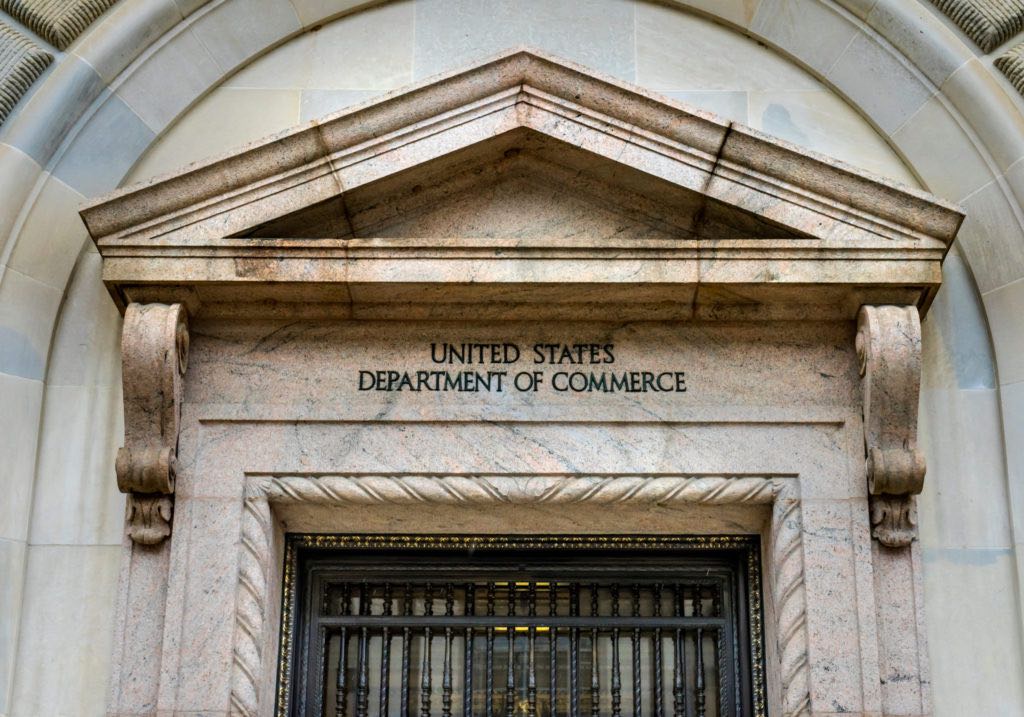
Remarks by Deputy Secretary of Commerce Don Graves at the Partnerships for Prosperity: U.S. Leadership in the Global Economy
Jul 26, 2022
Remarks by Deputy Secretary of Commerce Don Graves at the Partnerships for Prosperity: U.S. Leadership in the Global Economy
[email protected]
Tue, 07/26/2022 – 08:56
ICT Supply Chain
Manufacturing
AS PREPARED FOR DELIVERY
Monday, July 25, 2022
Office of Public Affairs
Don Graves
Hello, everyone. Dr. Lewis, thank you so much for that kind introduction, and thank you to the Center for Strategic and International Studies for hosting us today. And thank you all for being here and to all those joining online. It is wonderful to be here with you today.
Earlier this year, Dutch semiconductor equipment manufacturer ASML announced a $200 million expansion of their facility in Wilton, Connecticut.
This expansion is expected to create 1,000 new jobs and will support ASML’s work in developing the machines necessary to create advanced chips.
I was thrilled to join ASML’s CEO in Amsterdam for this announcement, not just because our international partners are creating high-quality family-sustaining jobs in the US, but also because of the recognition that American manufacturing is back.
At a time when our semiconductor supply chain is facing serious challenges and the global demand for chips is increasing, attracting this type of foreign investment to America is central to our work at the Commerce Department.
ASML is just one member of an ecosystem of private sector companies from around the globe who are choosing to invest in the United States as their home for semiconductors.
And I mention this example because it’s part of a much larger story about America’s reengagement with the world.
These types of investments, which are crucial to improving our competitiveness and creating jobs, don’t happen automatically. They require a concerted effort on the part of the federal government in coordination and cooperation with our partners in the private sector. I want to take some time today to discuss how the U.S. Department of Commerce is delivering on President Biden’s international economic agenda and how it is critical to meeting what he has called, ‘the defining challenge of our time’ – ensuring that our democratic institutions deliver real material gains for the American people.
Throughout our history, and especially since the end of World War II, we have recognized that the foundations of a prosperous, inclusive, and stable world economic order are free and democratic societies that:
value the rule of law and foster inclusion;
engage in fair and mutually beneficial trade;
offer choice, affordability, and availability of goods and services for consumers;
ensure opportunities and protections for the middle class and those seeking to enter the middle class;
and enable and protect innovation and entrepreneurship with creative and inclusive capital markets.
This work not only reflects our highest ideals – when we have adhered to those principles, it has been the source of our economic competitiveness, our geostrategic advantage, and our global leadership.
And yet, when President Biden took office, here at home, we were grappling with decades of underinvestment in our infrastructure, our workers, small businesses, rural economies, and communities of color.
Supply chain vulnerabilities and labor shortages undermined U.S. competitiveness, exacerbated inequality, and threatened long-term innovation and productivity. Foreign competitors continued to use unfair subsidies and dumping, harming U.S. producers.
Our non-democratic adversaries and competitors are ever-more aggressive in their efforts to control supply chains that we rely on. They expropriate critical technologies, while exporting authoritarianism and conflict and undermining the rules-based international order. They are also getting more aggressive at stealing our intellectual property.
In recent years, we haven’t always stood up to these challenges and engaged meaningfully with our allies. That has allowed our adversaries to make up ground [sometimes forcing countries around the world into unfair trade arrangements because they lack alternatives when we don’t show up].
And all the while, the world has been changing in ways that demand more, not less, U.S. leadership – more, not less, cooperation and coordination amongst free and democratic societies.
The pandemic, the climate crisis, Russia’s unjustified invasion of Ukraine, and global inflation are compounding these threats to stability, prosperity, and democracy.
At home, the Biden Administration is responding to these challenges by investing in infrastructure; promoting equity and supporting underserved communities; and building long-term resiliency through stronger supply chains and climate action.
But we also know that we need to foster opportunities abroad in order to create opportunities for success here at home.
During his campaign, President Biden pledged that he would “renew U.S. democracy and alliances, protect the United States’ economic future, and once more have America lead the world.”
Today, I’d like to focus on three areas where the Commerce Department, under the Biden-Harris Administration, is doing just that:
Revitalizing our economic alliances;
Protecting our national and economic security; and
Promoting the U.S. private sector as an international partner of choice
Revitalizing Economic Alliances
First, it is imperative that the U.S. revive strategic alliances with countries that share our democratic values and where our economic interests are intertwined. I know there are some who question the value of trying to forge these alliances, who would suggest that it is best to go it alone, but we believe that these alliances present tremendous opportunities for growth and shared prosperity.
From Europe to the Indo-Pacific, we are developing new forms of economic engagement that are fit-for-purpose to our most pressing challenges – from the energy transition to supply chain resilience, from combatting corruption to charting the future for the digital economy.
Only a year and half into the administration, our alliance-building efforts are exceeding expectations: we’ve stood up the U.S.-EU Trade and Technology Council, or TTC – co-chaired by Secretary Raimondo; we’ve deepened our commitments through the Quad; and the President has launched the ambitious 14-country Indo-Pacific Economic Framework for Prosperity and announced our intention to forge an Americas Partnership for Economic Prosperity.
We also continue to promote trade and investment between the US and Africa via Prosper Africa, the President’s Advisory Council on Doing Business in Africa, and the U.S.-Africa Leaders Summit, which President Biden will host in December.
Across these efforts, we reject the notion that attracting private sector investment requires an endless race to the bottom, harming American workers and American businesses alike. Instead, the new economic alliances are about developing shared rules of the road and aligning to high standards and building our shared capabilities.
We are also relying on joint partnerships between businesses and government to support joint research and knowledge sharing, upskilling and workforce development, innovation ecosystems, and promote investments that create export opportunities for U.S. companies and workers.
These efforts are already making a difference.
Take steel as an example.
For too long, China was able to flood the global market with cheap steel, making it more difficult for American workers to compete on a level playing field.
As a result, the previous Administration imposed tariffs on steel from the EU, UK, and Japan. This action had real world consequences for American companies.
Late last year, Pennsylvania-based American Keg – the only keg manufacturer in the U.S. – was having trouble securing stainless steel, putting jobs and production at serious risk.
The Commerce Department, through our International Trade Administration, helped American Keg secure 3 million pounds of U.S. steel, avoiding closure of its manufacturing facility in 2022 and preserving jobs.
And since then, we’ve secured new agreements with the EU, UK, and Japan on steel that are protecting American jobs – including in the steel industry, avoiding retaliatory tariffs, reducing inflationary pressures, and alleviating a major supply chain crunch. This work was facilitated by the relationships and goodwill we developed through the TTC.
By revitalizing our economic alliances through these kinds of agreements, we are rebuilding relationships, fighting unfair and abusive trade practices, and creating a more competitive global economy for America’s workers and businesses.
Protecting Our National and Economic Security
The second area of focus for our international economic agenda is the protection of our national and economic security. To meet this need, the Department of Commerce deploys a number of tools.
Through our Bureau of Industry and Security, we employ and enforce controls on sensitive goods, software, and technology to ensure our products are not used by bad actors.
In the Biden Administration, we have broken new ground in our export control partnerships.
Nowhere is this better illustrated than the measures we imposed against Russia for invading Ukraine.
In record time, we built a coalition of 37 like-minded partners from Europe to the Indo-Pacific, all of whom agreed that Russia’s actions represent a global security threat that cannot go unanswered.
This momentous and unprecedented collaboration is having its desired effects.
Russia is struggling to access vital technological inputs. Its semiconductor imports, the lifeblood of Russia’s weaponry, have dropped by 74%.
The aerospace controls we put in place are restricting Russia’s ability to generate revenue, resupply, and support its military aviation sector. Russia may be forced to ground between half and two-thirds of its commercial aircraft by 2025 in order to use them for spare parts.
Russia’s economy has slowed significantly due to multilateral sanctions and could shrink by up to 15%. Overall imports could collapse by up to 40% this year.
Our tools do not end there. We are pushing back against unfair trade and investment practices by global competitors.
That means continuing to rigorously enforce our antidumping and countervailing duty laws to level the playing field for American companies and workers.
We are also monitoring trade agreements to ensure foreign governments are complying with their obligations.
We remain vigilant in our review of inbound investment in U.S. companies and operations for national security concerns under CFIUS, the Committee on Foreign Investment in the United States.
We’re working to prevent foreign adversaries from gaining a foothold with their technologies that threaten our national security, including the systems that underpin our critical infrastructure. We’re taking action under President Biden’s executive order to address the threat posed to our information and communications technology and services supply chain.
Through all of these tools, both offensive and defensive, and importantly, in partnership with our allies, we’re protecting our national security and ensuring fundamental fairness for our workers and businesses.
Promoting the U.S. Private Sector
The third area of focus is promoting the U.S. private sector as a partner of choice globally, including in developing countries.
While direct foreign aid is important, we need strong contributions from U.S. businesses – relying on their historical strengths as long-lasting commercial partners, exporters of quality goods and services, and world-class investors.
This is critical to differentiating ourselves from our geostrategic competitors, especially in the area of global infrastructure.
The U.S., our international partners in the G7, and our private sector have a long history of providing financing and technical support for quality infrastructure projects around the world.
And yet, for many years, we have faced several challenges when competing for these projects, like lower-cost but lower-quality competition; more aggressive commercial diplomacy by our competitors; and risks to doing business in foreign markets coupled with market access barriers.
As a result, our businesses have missed out on opportunities to deliver infrastructure at scale around the world while also creating jobs here at home.
And partner countries have missed out on infrastructure options that are not only more responsive to their needs but more impactful and sustainable relative to their national goals.
But that’s changing.
Last month, President Biden and the G7 leaders formally launched the Partnership for Global Infrastructure and Investment, or PGII.
The Partnership will boost U.S. efforts to offer high-quality, high-impact infrastructure options. Together, the partners will bring to bear over $600 billion in public and private investment, with the U.S. contributing a full $200 billion over five years.
Through PGII and the long-standing work of our U.S. and Foreign Commercial Service, Commerce is redoubling its efforts to help U.S. companies offer developing countries better infrastructure options across strategic sectors.
U.S. companies have already signed deals that reflect this high-quality, high-standard, and high-impact approach.
I saw this first-hand on my visit to Cote d’Ivoire in June. The ABD group, a Philadelphia-based project development company, was awarded a $320 million healthcare infrastructure project to renovate or construct over 100 hospitals and clinics across Cote d’Ivoire.
The Prime Minister of Cote d’Ivoire told me that they want to do more of these kinds of projects with our companies, leveraging our ideas, resources, goods, and services, and working closely with Ivorians to create opportunities for both countries. I’ve heard similar sentiments from governments and private sectors around the world.
This example is emblematic of what the U.S. is doing globally – working with partner countries to improve the commercial enabling environment for our companies; improve financing options; grow the pipeline of high-quality, bankable projects; and importantly, positioning U.S. business at the front-end of the deal pipeline.
Before I close, I also want to emphasize that equity underpins all of our work.
When we create new international commercial opportunities – in infrastructure, clean tech, digital, and health systems – we want more of our small businesses, more of our women- and minority-owned companies to be able to compete on a level playing field. That will ensure that our commercial success abroad is also broadly shared here at home, especially for our small businesses, businesses in the heartland, women- and minority-owned companies, and historically marginalized communities.
Many of these companies, especially in diaspora communities, not only reflect the diversity of our nation, but are also best positioned to help us in many of these places around the globe.
Conclusion
We are at a critical moment. If we act decisively along the lines I’ve described, we can continue to shape the international economic order in ways that reflect our values and expand opportunities for Americans for years to come.
With our middle class and its prosperity as our beacons, we have an opportunity to revive economic relationships that play to our strengths and fit the specific challenges of this time.
We can foster opportunities abroad to also create opportunities right here at home.
In the last 18 months, the Biden Administration has laid the foundation for a new approach to economic engagement.
Through these actions, we’ll create high-quality, high-paying jobs of the future.
We’ll boost export opportunities for companies.
We’ll unleash innovation so we can address the problems of today and the future, like climate change.
And if we do this right, we’ll uplift women, people of color, and underserved communities across the country.
Under President Biden’s leadership, and with the Commerce Department taking a central role, America is back on the world stage.
By revitalizing alliances, protecting our security, and focusing on being a partner of choice, we can usher in a new era of common peace and prosperity, meet pressing needs, and secure American leadership in the 21st century.
I’m honored to be doing that work. Thank you.
Read the full report from the U.S. Department of Commerce: Read More




